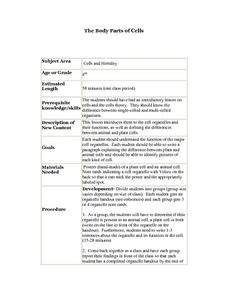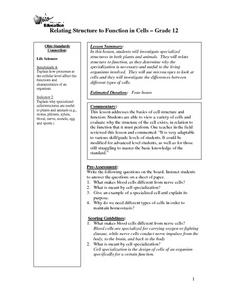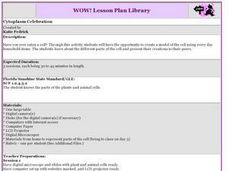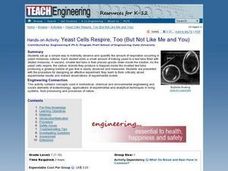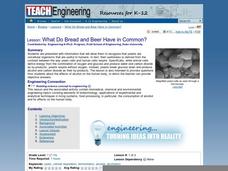Curated OER
Human Epidermal Cells
Learners explore epidermal cells. After following specified procedures for removing epidermal cells from their wrist, students view the cells with the use of a microscope. After creating a drawing of their observation, learners label the...
Curated OER
Viewing Bacteria
Students investigate the characteristics harmful and helpful bacteria and observe structures within the bacterial cells. They use micro-slide viewers to observe the shapes of various bacteria and the structures within the bacterial cell.
Curated OER
The Body Part of Cells
Eighth graders are introduced to cell organelles and their functions and the they define the differences between animal and plant cells. They write a paragraph explaining the difference between plant and animal cells and students...
Curated OER
Genetics and Heredity: The Next Generation
Tenth graders work in teams to order events of DNA transcription and translation protein synthesis. In the second lesson, they put the steps of mitosis and meiosis in order using a concept map poster. They use modeling clay to create...
Curated OER
Cells
Students explore the cell and cell processes. They create "cytoplasm", make a model of the cell and its organelles, and simulate the osmosis and the diffusion of materials into and out of the cell.
Curated OER
Relating Structure to Function in Cells
Twelfth graders investigate specialized structures in both plants and animals. They relate structure to function, as they determine why the specialization is necessary and useful to the living organisms involved. They use microscopes...
Curated OER
Cytoplasm Celebration
Students create a model of a cell using everyday household items. They view digital microscope images of cells and cell parts, watch an online video, create a cell model out of household images, and record their presentation using a...
Curated OER
Cell Types and Parts
Eighth graders, after creating a Venn Diagram comparing/contrasting animal and plant cells, writing ten similes describing cell types, or drawing a colored diagram of a cell, list cell types as well as describe and label cell parts. They...
Curated OER
The Building Blocks of Life: Cell Building
Learners view a short video from www.unitedstreaming.com. They then construct parts of a cell by building a model of an animal and plant cell using regular household materials.
Curated OER
Charlie and the Cell City
Students investigate the major components of the cell and their function through an adventure inside the cell with an imaginary little guy named "Charlie." Through the use of the Internet and viewing a video, students identify components...
Curated OER
Let's Get Organized
Sixth graders identify table and each of its parts, including cell, column, row, header, and formula bar. Students then explain how tables are used to store and organize information in database, organize and categorize information...
Curated OER
A Pox No Longer Upon Us
Tenth graders research the development and use of vaccines. They examine historical documents for qualitative observations and the basis of immunization. They examine primary and secondary immune responses as they relate to the...
Curated OER
Never Say Die: The CLock of Life
Students explore ways to turn back the genetic clock. They explore cells and mitosis. Students participate in an activity to create a flip book that will animate the process of mitosis. They explain each stage of mitosis.
Curated OER
Cells, Cells, Cells
Students explore plant and animal cells. Using household items, students create a three-dimensional model of a plant or animal cell. Students identify and label each cell part.
Curated OER
The Spanish Omelet
Students use analogies to show the relationships among cell, nucleus, genes, chromosome, ribosome, replication, mitosis, transcription, translation, DNA, RNA, amino acids and proteins, genotype, phenotype, and genetics vs. environmental...
Curated OER
Cell Observation Exercise
Students take measurements of the distance between the objective and the slide when in focus with each objective. They determine the diameter of the field of view at each power in order to determine the size of the cells being observed.
Curated OER
Diffusion
Students design and carry out an experiment according to the scientific method. The experiment must test the effects of time and concentration on the rate of diffusion of potassium permanganate into potato cubes. After performing the...
Curated OER
Plasmolysis in Elodea Plant Cells
Students microscopically observe various subcellular components. They determine the effects of different salt solutions on Elodea plant cells. They detect the presence of chloroplasts, cell walls, and cell membranes of Elodea.
Curated OER
Electron Transport System Made Fun and Easy:
Students identity the components of electron transport system through role play. They explain the role of intermediate energy carriers to the production of ATP molecules. They describe the relationship of electron transport system to...
Curated OER
What's Outside the Cell Membrane ?
Learners examine the cell coats (matrix) of chondrocytes and fibroblasts and observe these cells actively exclude particles which are released around them. They observe the function of the cell membrane as a gatekeeper as it prevents...
Curated OER
TE Activity: Yeast Cells Respire, Too (But Not Like Me and You)
Student observe and quantify the respiration that occurs in yeast-molasses cultures. They complete an effective experiment in order to examine how to think critically about the results.
Curated OER
Acting Potential
Students set up a cell membrane with the material provided by their teacher and then arrange beads properly to show how the sodium and potassium ions are arranged. They then make a model representing the axon of a neuron.
Curated OER
What Do Bread and Beer Have in Common?
Students listen to an explanation of yeast cells and how they effect bread and beer. They discuss the ways alcohol affects the human body and participate in an indirect observation about cell respiration in yeast-molasses cultures.
Curated OER
Create Your Geometry Crossword
Students learn how to identify cell addresses, format cell contents, add pop-up comments to a cell, and also apply conditional formatting. They use clues and words to make a geometry crossword puzzle pertaining to geometrical shapes.




